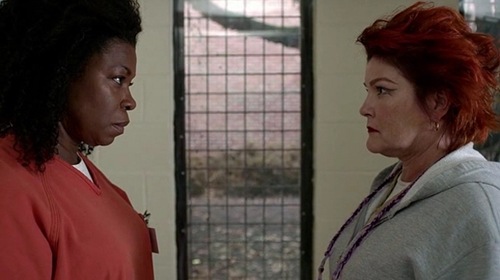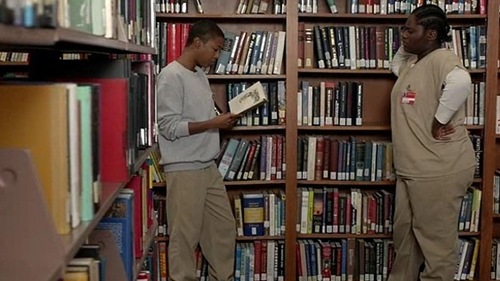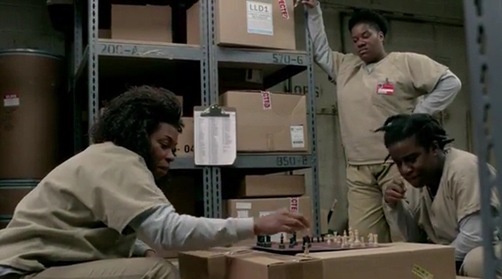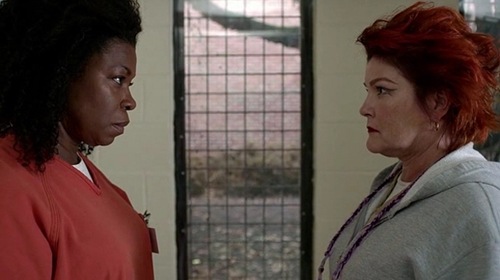Written by Katherine Murray.
The second season of Orange is the New Black is all about respect: how you get it, how you keep it, whether it’s something that someone can give you, or something you hold for yourself. Anchored by a standout performance by Lorraine Toussaint, this season is darker and richer than its predecessor, but still extremely fun to watch.

To recap: Orange is the New Black is that insanely popular Netflix series about a minimum security women’s prison. The second season went online earlier this month, and it ranks about the same as the first season, in terms of being very entertaining and slightly uneven. If there’s one reason to watch it, though, it’s for the pleasure of seeing Lorraine Toussaint knock it out of the park as this season’s new villain, Vee.
Toussaint, whom you may remember from a very long list of acting credits (I remember her from Ugly Betty), brings so much presence, intensity, and commitment to this role that she steals every scene she’s in. You can’t take your eyes off her – and that’s part of the point.
Vee, who’s introduced to us as Taystee’s foster mother, is an actual sociopath who somehow slipped into minimum security. She’s supposed to be magnetic, charismatic, and charming in a way that draws people to her despite the fact that she’s obviously going to murder them. The performance succeeds not only because it creates a memorable character, but because it allows the audience to experience the same draw — it’s clear from the start that Vee’s an awful human being, but we want more of her, all the same.
Maybe in response to criticism of the first season, or maybe just because this is a natural evolution, the second season of Orange is the New Black is less focussed on Piper (who served as the first season’s protagonist), and more focussed on the other inmates of the prison. The A-story, this time, concerns Vee’s arrival at Litchfield, and the way she lures some of the other characters into her web so that she can use them to smuggle in drugs. This puts her in conflict with Red (who normally corners the market on contraband), and creates a rift between Taystee and Poussey, who’ve been BFF this whole time.
While flashbacks have never been this show’s strong suit – they’re heavy handed, and they over-simplify complex situations by boiling them down into ten-minute narratives – this season throws roughly eight-hundred million our way, as a means of explaining the motivations of the major players in the season finale. In general, the flashbacks are not very good, but one thing they do nicely is lay the groundwork for the dynamics we see play out between Vee and the group. The flashbacks involving Taystee explain why she’s loyal to Vee – Vee may have been a lousy foster mother, but she’s the only real family Taystee has. There’s one really good scene that shows Taystee, her foster brother, R.J., and Vee, sitting down to a normal family dinner; you can tell from the expression on her face – and a nice bit of acting from Danielle Brooks – that this is one of Taystee’s best memories – a moment of real happiness in an otherwise difficult life.
The flashbacks also impress upon us that Suzanne (a.k.a. “Crazy Eyes”) feels rejected and like an outsider – something Vee immediately exploits by love bombing her in an obvious way – and that Cindy needs to prove herself as an adult. (Janae already got a flashback in season one, and we know she’s pissed off because she keeps going to solitary for no real reason.) More importantly, though, the flashbacks show us that Poussey, who seems like she was pretty rad on the outside, is an independent thinker who’s willing to fight for her relationships. Unsurprisingly, there’s a lot of conflict between Poussey and Vee, and the strongest emotional story line of the season is about Taystee being caught between them.

There are several other story lines this season – Dayanara and the idiot guard who impregnated her are still trying to figure things out; Rosa, the cancer patient, is quickly getting worse; a new inmate named Soso goes on a hunger strike; Pennsatucky has new teeth – but, like the A-story, most of them revolve around respect.
Daya wants the idiot guard to come clean and take his lumps so that they don’t have to lie for the rest of their lives (so that they can respect themselves by living truthfully). The idiot guard experiments with being a hard-ass in order to win some respect from his boss and the inmates – which leads Daya to explain, in a heavy-handed way, that he doesn’t need to bully anyone; the fact that he has a choice about what he does already gives him more power than any of the inmates have.
Soso, a college-aged inmate, initially refuses to shower for unspecified reasons, though it eventually becomes clear that she feels ashamed to be naked in front of everyone else. After the guards force her to do it anyway – in a scene that’s excruciatingly uncomfortable to watch – she starts a hunger strike as a way to reclaim some of her dignity by fighting back against the system. While she attracts some followers who aren’t very serious about prison reform, she also attracts a few people with legitimate grievances. We’re invited to laugh at the protest, but it’s a way for several characters, with different motivations, to try to gain respect.
The A-story, which is about the fight for control of the contraband line – between three opposing, racially segregated camps, represented by Vee, Red, and Gloria Mendoza – is really about individual women trying to hold onto positions that give them a positive sense of self. Controlling the kitchen gives Mendoza higher status in the prison, and it lets her give cushier jobs to the other Latina women; controlling the contraband line gives Red special status, and allows her to buy herself friends; controlling other people feeds Vee’s sociopathic drive to power.
There’s a moment, late in the season, where Vee jokes that it’s stupid to kill and die over who can sell mascara in prison – but that’s not what the fight is about. It’s about holding onto a sliver of self-respect in a place where you have to lie down on the ground when you hear an alarm; it’s about having something that’s yours in a place where you are a number, and issued the same clothes as everyone else.
It’s easy to understand how it would be detrimental to someone to be on a chain gang, to be assaulted, or tied up like an animal while she gives birth – but it’s also detrimental to be treated like you’re not a person, no matter how nice the cellblock is. What Orange is the New Black shows us effectively is women trying to hold onto personhood, even in difficult times.

The first season ended with Piper beating the shit out of Pennsatucky – a meth addict who’d harassed her all season, and pushed her so far that she snapped. The second season dives farther into that same well of darkness, striking an awkward (and sometimes confusing) balance between acknowledging Litchfield as kind of a candy-ass prison, and stirring things up by releasing a predator into the mix.
There are moments that are disappointing, there are moments that are cop-outs, there are moments that are sickeningly sweet, there are moments that don’t make sense, there are moments that seem kind of creepy and slightly misogynist (see: Caputo’s ill-gotten blowjob from Assistant Warden Fig) – but, one of the things that’s always been worthwhile about this show is that most of its characters – good, bad, dull, interesting, funny, sexy, cruel, cunning, average – are played by women, and that means that we get to see something we don’t normally get to see on TV. We get to see complex stories about human nature where “human” doesn’t default out to “male.” That’s the first thing everyone says when they write about Orange is the New Black – I know – but it’s worth saying again, because it’s such an unusual thing.
Season two, if anything, is stronger than season one, since it widens its focus, and gives more of its characters a chance in the spotlight. It’s also stronger because it’s gone beyond the story of season one (being in prison is hard, and it’s not like being out of prison at all), to explore something deeper. It’s pounding the same drum of “prisoners are people,” and, for those of us who already know that, that drum can get old, but this season at least drums with style.
Orange is the New Black is not on my list of “World’s Greatest Television Shows,” but Lorraine Toussaint may be on my list of “Greatest Performers in a Television Show,” and the series is doing something important by modelling how you can have a diverse cast of characters made up of women, and how you can tell stories about our universal humanity, when the humans in question are female.
So, if you didn’t binge watch it opening weekend, it’s worth a look, just to see something different. If you did binge watch it, you already know.
Katherine Murray is a Toronto-based writer who yells about movies and TV on her blog.
